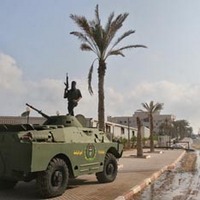100 Activists to Be Allowed into Blockaded Gaza
The decision split delegates from more than 40 countries who came to Cairo planning to reach the Palestinian enclave, which shares the Rafah border crossing with Egypt.

Some organisers said Egypt's offer was a victory after it initially refused to allow any of the protesters into the Gaza Strip for the Gaza Freedom March, which is scheduled to take place on Thursday.
"It's a partial victory," said Medea Benjamin, an American activist and one of the demonstrations organisers. "It shows that mass pressure has an effect."
They said the foreign ministry offered to let them choose 100 delegates who would be allowed into Gaza. They were due to leave Cairo for Gaza on Wednesday morning.
Activists have staged demonstrations and sit-ins around Cairo to push for entry to Gaza. Dozens of French activists camped out in front of their embassy in Cairo after being refused passage , AFP reports .
Meanwhile, l ast week, Egypt gave its critics additional cause for complaint by not allowing an aid convoy led by British MP George Galloway to enter Egypt through the Nuweiba port on the Gulf of Aqaba. The convoy, initially comprising about 70 trucks, went through Europe to Turkey, where it picked up several dozen more trucks, and thence to Syria and Jordan. From Jordan, the organizers wanted to cross into Sinai and continue to Gaza. But Egypt said the convoy could come in only through the Mediterranean port of Al Arish.
Galloway saw this as further Egyptian harassment of Gaza's residents and expressed his opinion of it in a letter to the Egyptian president. But Egypt was unmoved. Aid or no aid, "no convoy is going to dictate Egypt's decision on this matter," a Foreign Ministry spokesman asserted.
Turkey then stepped in and offered to mediate. The outcome is that while the convoy will indeed not enter via Nuweiba, it will be able to go back through Syria and from there to Al Arish, where Egypt has undertaken to allow it in without difficulties , Ha'aretz reports .
News agencies also report, the crossing, at Rafah, Egypt, has been closed for most purposes since the summer of 2007, when the militant group Hamas seized control of Gaza from the rival Western-backed forces of Fatah. Israel imposed a blockade on Gaza, and the Egyptian government, citing its own security needs, closed the crossing, drawing criticism from within Egypt and across the Arab world.
International criticism of Israel spiked after the Gaza assault, which left as many as 1,400 Palestinians dead, including hundreds of civilians. Thirteen Israelis were killed. While both sides were accused of war crimes, most of the outrage was focused on Israel because of its overwhelming military strength and the enormous differences in the death tolls.
International activists have been challenging Israel’s control of Gaza’s waters, sending in boats to bring in supplies and convey support; Israel has blocked many.
Egypt repeatedly refused to open its border ahead of the planned march, citing what its officials said were “security reasons,” but participants in the march flew to Cairo anyway, hoping the government would relent, The New York Times reports.
Subscribe to Pravda.Ru Telegram channel, Facebook, RSS!


